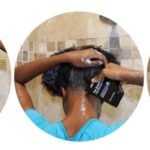
If you’re a black woman with natural hair, you may have wondered how to restore the health of your scalp. It’s common for hair concerns to extend beyond just the strands themselves, and the scalp plays a crucial role in maintaining healthy locks. In this article, we’ll explore effective tips and tricks to help you revitalize your scalp and bring back its natural radiance. Furthermore, we’ll highlight some recommended hair care brands that cater specifically to the needs of black women with natural hair. So, say goodbye to scalp woes and hello to a healthier, happier head of hair!
Understanding the Importance of a Healthy Scalp
Your scalp is the foundation of healthy hair. Just like the soil is vital for the health and growth of plants, your scalp plays a crucial role in the quality and appearance of your hair. The condition of your scalp directly affects the health of your hair follicles, which in turn determines the strength, shine, and overall vitality of your hair strands.
Relation between scalp health and hair quality
A healthy scalp creates the optimal environment for hair growth. When your scalp is free from issues such as dryness, oiliness, or inflammation, your hair follicles are able to function at their best. This means that nutrients can reach the hair roots more efficiently, leading to stronger and healthier hair strands.
On the other hand, an unhealthy scalp can have a detrimental effect on your hair. Conditions like dandruff, itching, or excessive oil production can lead to clogged hair follicles, hampering hair growth and potentially causing hair loss. Thus, taking care of your scalp is not only crucial for hair health, but it also prevents potential hair problems in the long run.
Common signs of an unhealthy scalp
So, how can you tell if your scalp is not as healthy as it should be? There are several signs to look out for. If you frequently experience itchiness, flakiness, or redness on your scalp, these could be indications of an unhealthy scalp. Excessive oiliness or dryness are also signs that your scalp might not be in its best condition. Furthermore, if you notice hair thinning, excessive hair shedding, or slow hair growth, these could also be attributed to an unhealthy scalp.
How an unhealthy scalp affects overall health
It’s not just your hair that suffers when your scalp is unhealthy. Many studies have indicated that scalp conditions, such as dandruff or seborrheic dermatitis, are often associated with psychological distress, including feelings of embarrassment and low self-esteem. Furthermore, some scalp conditions can lead to bacterial or fungal infections, which can have systemic effects on your overall health.
Taking care of your scalp is not just about vanity; it is an essential part of maintaining overall well-being. By prioritizing your scalp health, you are not only promoting the vitality of your hair but also contributing to your own self-confidence and overall quality of life. So, let’s dive into how you can determine your scalp type and care for it accordingly.
Determining Your Scalp Type
Understanding your scalp type is the first step towards achieving a healthy scalp. Just like skin types, scalps can vary greatly from person to person. Identifying your scalp type will allow you to choose the most appropriate hair care routine and products, tailored specifically to your scalp’s needs.
Identification of different scalp types
Scalp types can be broadly classified into three main categories: oily, normal, and dry. Oily scalps tend to produce an excess amount of sebum, leaving the scalp and hair feeling greasy even shortly after washing. Normal scalps have a balanced sebum production, resulting in hair that stays clean and shiny for a considerable amount of time. Dry scalps, on the other hand, lack sufficient sebum production, leading to itchiness and flakiness.
To determine your scalp type, observe how your scalp feels a day or two after washing. If it becomes excessively oily, you likely have an oily scalp. If it remains relatively clean and comfortable, you most likely have a normal scalp. And if you experience dryness, itching, or flaking, you probably have a dry scalp.
Understanding how scalp type affects scalp health
Each scalp type comes with its own set of challenges and requirements. Oily scalps are prone to clogged hair follicles and can benefit from regular deep cleansing to remove excess sebum and impurities. Normal scalps require balanced care to maintain their healthy state and prevent any imbalances. Dry scalps need extra hydration and gentle care to alleviate dryness and reduce flaking.
When you tailor your hair care routine to your specific scalp type, you can address its unique needs, maintain a healthy balance, and prevent or manage scalp conditions. Let’s delve into how you can choose the right products and develop a personalized hair care routine that caters to your scalp type.
Proper Cleansing of the Scalp
Cleansing your scalp is a fundamental step in maintaining its health and preventing common issues. It helps remove dirt, excess oil, product buildup, and dead skin cells, allowing your hair follicles to breathe and promoting optimal hair growth. However, the way you cleanse your scalp and the products you use can greatly impact its condition.
Choosing the right shampoo for your scalp type
When selecting a shampoo, it’s crucial to consider your scalp type. For oily scalps, opt for a clarifying or balancing shampoo that effectively removes excess sebum without stripping the scalp of its natural oils. Look for ingredients like tea tree oil or salicylic acid, known for their cleansing and clarifying properties. For normal scalps, choose a gentle shampoo that maintains the scalp’s natural balance while keeping the hair clean and manageable. Dry scalps benefit from moisturizing shampoos that provide hydration and alleviate dryness.
The correct way to wash your hair and scalp
Proper technique plays a significant role in effective scalp cleansing. Start by thoroughly wetting your hair and scalp with warm water. Apply a small amount of shampoo to your palm, rub your hands together to create a lather, and gently massage the shampoo into your scalp using your fingertips. Avoid using your nails, as it can cause irritation. Focus on massaging the shampoo into your scalp rather than the hair lengths. Rinse thoroughly and repeat if necessary.
Importance of regular scalp exfoliation
Just like exfoliating your skin helps remove dead cells and promote a clearer complexion, exfoliating your scalp can improve its health and condition. Scalp exfoliation helps unclog hair follicles, remove buildup, stimulate circulation, and promote hair growth. You can use a gentle exfoliating scalp scrub once or twice a month, or even create your own at home using ingredients like sugar or oatmeal.
Now that you know how to properly cleanse your scalp, let’s talk about maintaining the right moisture balance for a healthy scalp.
Maintaining the Right Moisture Balance
The right moisture balance is essential for a healthy scalp. While the scalp naturally produces sebum to moisturize and protect the hair, an imbalance can lead to uncomfortable dryness or excessive oiliness. Achieving and maintaining the right moisture balance is key to scalp health and overall hair vitality.
Understanding the importance of scalp hydration
Just like any other part of your body, your scalp requires adequate hydration to function optimally. Proper scalp hydration promotes healthy hair growth, prevents dryness and itching, and maintains scalp elasticity. It also helps regulate sebum production, reducing the appearance of excessive oiliness.
Choosing hair products that promote moisture balance
To maintain a balanced scalp moisture level, it’s essential to choose the right hair care products. Look for shampoos and conditioners that are specifically formulated for your scalp type and prioritize moisturizing ingredients. For dry scalps, opt for products containing hydrating elements like aloe vera, shea butter, or coconut oil. Oily scalps can benefit from lightweight, oil-free formulations that provide hydration without weighing the hair down.
Preventing scalp dryness or oiliness
Preventing scalp dryness and oiliness requires a combination of proper cleansing, conditioning, and regular maintenance. Avoid over-washing your hair, as it can strip the scalp of its natural oils and lead to dryness. Similarly, refrain from using heavy, greasy hair products that can contribute to oiliness. Regularly condition your hair, focusing on the ends while avoiding the scalp area. Additionally, protect your scalp from extreme temperatures, as both excessive heat and cold can disrupt the moisture balance.
Next, let’s explore how your diet can impact the health of your scalp.
Eating for Healthy Scalp
You might have heard the saying, “You are what you eat.” Well, it holds true for your scalp health as well. Your diet plays a significant role in nourishing your scalp and promoting healthy hair growth. By incorporating key nutrients into your meals, you can strengthen your scalp from within and achieve luscious, vibrant hair.
Key nutrients that promote scalp health
Certain nutrients are particularly beneficial for scalp health. Omega-3 fatty acids, found in foods like flaxseeds, salmon, and walnuts, help reduce inflammation and promote a healthier scalp. Biotin, commonly found in eggs, nuts, and leafy greens, strengthens hair follicles and reduces hair breakage. Vitamin C, abundant in citrus fruits and bell peppers, aids in collagen production, essential for maintaining scalp elasticity. Finally, zinc, present in foods like oysters and pumpkin seeds, supports hair growth and prevents scalp dryness.
Adjusting your diet for a healthier scalp
To promote a healthy scalp, try incorporating these nutrient-rich foods into your diet. Opt for a balanced diet that includes a variety of fruits, vegetables, lean proteins, and whole grains. Consider adding a daily supplement containing biotin or omega-3 fatty acids if you struggle to obtain these nutrients through your diet alone. Remember, a nourished scalp leads to healthy hair, so start from within.
Understanding how hydration affects scalp health
We’ve discussed the importance of external hydration for the scalp, but it’s equally vital to maintain internal hydration. Drinking an adequate amount of water throughout the day not only keeps your body hydrated but also ensures that your scalp receives the moisture it needs. When you’re dehydrated, your body prioritizes vital organs over the scalp, leading to dryness and potential scalp issues. So, make sure to drink enough water to keep both your body and scalp hydrated.
Now that we’ve covered the importance of nutrition for a healthy scalp, let’s explore some hair care brands that cater specifically to black women with natural hair.
Reliable Hair Care Brands for Black Women with Natural Hair
For black women with natural hair, finding the right hair care products can be a game-changer. Natural hair requires special care and attention, and fortunately, there are several reliable hair care brands that cater specifically to the unique needs of black women’s hair.
Exploring brands that cater specifically to black women’s hair
Brands such as SheaMoisture, Cantu, and Mielle Organics have gained popularity and recognition for their dedication to providing high-quality products that enhance the health and beauty of natural hair. These brands understand the challenges faced by black women, including moisture retention, curl definition, and scalp health. They offer a wide range of products, including shampoos, conditioners, styling creams, and oils, formulated with natural ingredients that nourish and protect natural hair.
Appreciating the uniqueness of natural hair
Natural hair is beautiful and diverse, showcasing a wide range of textures, curl patterns, and densities. It is essential to embrace and appreciate the uniqueness of your natural hair, rather than striving to conform to societal standards of beauty. By using hair care products specifically designed for black women’s hair, you can nurture and celebrate the authentic beauty of your natural tresses.
How these brands promote scalp and hair health
These hair care brands prioritize the health of both the scalp and the hair. Many of their products are formulated with ingredients like shea butter, jojoba oil, and aloe vera, which provide deep hydration, promote scalp health, and help maintain the natural moisture balance of the hair. By using products from these brands, you can enhance the health, strength, and manageability of your natural hair while nurturing a healthy scalp.
Now that we’ve covered the importance of hair care brands for black women with natural hair, let’s explore how scalp massages can improve blood circulation and contribute to better hair growth.
Using Scalp Massages to Improve Blood Circulation
A soothing scalp massage not only feels incredible but also brings a range of benefits for both your scalp and hair. Massaging your scalp regularly can improve blood circulation, stimulate the hair follicles, and enhance the overall health and growth of your hair.
Benefits of scalp massage
Scalp massages have a plethora of benefits. They promote increased blood circulation to the scalp, thereby nourishing the hair follicles with essential nutrients. This enhanced circulation stimulates hair growth and improves the overall health and strength of your hair. Scalp massages also help relieve stress and tension, which can contribute to healthier hair growth and reduce the risk of hair loss.
Techniques for a proper scalp massage
To perform a proper scalp massage, start by using your fingertips to gently apply pressure to your scalp in circular motions. Focus on areas that feel tense or sore. You can use natural oils like coconut or castor oil to facilitate smooth movements and add an extra dose of nourishment. Take your time and enjoy the relaxation that comes with a scalp massage.
How regular scalp massages affect hair growth
Regular scalp massages can work wonders for your hair growth journey. By improving blood circulation, massaging the scalp ensures that the hair follicles receive an ample supply of oxygen and nutrients. This revitalizes dormant follicles and encourages the growth of new, healthier hair strands. Additionally, the relaxation provided by scalp massages reduces stress levels, which can indirectly influence hair growth patterns.
Now, let’s discuss how to deal with common scalp conditions and promote better scalp health.
Dealing With Scalp Conditions
Scalp conditions like dandruff, psoriasis, or seborrheic dermatitis can be frustrating, uncomfortable, and often impact your scalp’s health. However, with proper management and care, it is possible to alleviate the symptoms and improve the overall health of your scalp.
Common scalp conditions like dandruff and psoriasis
Dandruff is a prevalent scalp condition characterized by flaking and itchiness. It is often caused by overactive oil glands, dryness, or an imbalance of the scalp’s natural microbiome. Psoriasis, on the other hand, is a chronic condition that can lead to red, scaly patches on the scalp. Both conditions can be managed with the right approach and care.
How to manage these conditions to improve scalp health
To manage scalp conditions like dandruff, opt for anti-dandruff shampoos containing ingredients like zinc pyrithione, ketoconazole, or selenium sulfide. These ingredients help reduce the excessive growth of the yeast responsible for dandruff. Gentle exfoliation can also help remove dead skin cells and alleviate flakes. For more serious scalp conditions like psoriasis, it is best to consult a dermatologist who can provide targeted treatment options.
When to seek professional help for scalp conditions
While home remedies and over-the-counter products can help manage mild scalp conditions, it is essential to seek professional help if the symptoms persist, worsen, or cause significant discomfort. A dermatologist or a trichologist can accurately diagnose the issue and recommend appropriate treatments tailored to your specific scalp condition. Remember, seeking expert advice is crucial for addressing severe or chronic scalp conditions in a safe and effective manner.
Now let’s dive into the world of hair treatments and masks that can contribute to scalp restoration and overall hair health.
Using Hair Treatments and Masks for Scalp Restoration
Hair treatments and masks can provide deep nourishment and restore the health of your scalp. Whether you prefer store-bought products or homemade remedies, incorporating these treatments into your hair care routine can promote scalp restoration and enhance the overall vitality of your hair.
Choosing the right hair and scalp treatments
When choosing hair and scalp treatments, look for products specifically created to address your scalp’s needs and targeted concerns. Determine whether your scalp requires extra hydration, soothing, or detoxification. Scalp serums, oils, or masks that contain natural ingredients like aloe vera, tea tree oil, or rosemary can revitalize the scalp and promote healthier hair growth. Consider patch testing any new products or treatments to ensure they are suitable for your scalp.
Benefits of homemade and store-bought hair masks
Both homemade and store-bought hair masks have their own set of benefits. Homemade masks allow you to select ingredients based on your specific needs and preferences. Natural ingredients like avocado, honey, and yogurt can deeply moisturize and nourish the scalp and hair. Store-bought masks, on the other hand, often contain a curated blend of ingredients designed to target specific concerns. They offer convenience and consistency, making them ideal for those seeking a hassle-free approach to scalp and hair care.
How consistent treatment contributes to scalp recovery
Consistency is key when it comes to hair treatments and masks. For scalp restoration and overall hair health, incorporate these treatments into your routine on a regular basis. Aim for at least once a week, or as recommended by the product or your hair care professional. Consistent treatment allows the active ingredients to penetrate the scalp and hair, providing the nourishment needed to restore scalp health and promote lush, vibrant hair.
Lastly, let’s discuss some damaging habits that can harm the scalp and how to replace them with healthier routines.
Avoiding Damaging Habits for a Healthy Scalp
To maintain a healthy scalp, it is important to identify and eliminate damaging habits that can hinder its health and lead to common issues such as scalp dryness, flaking, or hair loss. By adopting healthier routines, you can ensure long-term scalp health and promote the vitality of your hair.
Bad habits that harm the scalp
Certain habits can have a negative impact on scalp health. Overwashing your hair can strip away the natural oils that keep your scalp moisturized, leading to dryness and potential flaking. Using excessively hot water during hair washes can also contribute to scalp dryness and irritation. Additionally, regularly using heat styling tools at high temperatures without proper heat protection can damage the scalp and weaken the hair strands.
Replacing harmful habits with healthier routines
To promote a healthy scalp, it’s crucial to replace harmful habits with healthier alternatives. Limit hair washes to two or three times a week to allow your scalp’s natural oils to moisturize and protect. When washing your hair, opt for lukewarm water instead of hot water to avoid excessive dryness. Prioritize heat protectant sprays or serums when using styling tools to shield your scalp and hair from heat damage. By making these simple changes, you can preserve the health of your scalp and promote stronger, more resilient hair.
Ingraining consistent care habits for long-term scalp health
Consistency is key when it comes to scalp care. Establishing a routine and sticking to it is crucial for long-term scalp health. Commit to a hair care regimen that includes regular cleansing, conditioning, and scalp treatments. Protect your scalp from harsh environmental factors, such as excessive sun exposure or extreme cold. By ingraining consistent care habits into your daily life, you can ensure the health and vitality of your scalp for years to come.
In conclusion, understanding the importance of a healthy scalp is essential for maintaining the health and growth of your hair. By determining your scalp type, properly cleansing and moisturizing your scalp, incorporating a nutritious diet, using hair care products tailored to your needs, and adopting healthy scalp care habits, you can promote optimal scalp health and achieve luscious, vibrant hair. Remember, a healthy scalp is the foundation for healthy and beautiful hair, so invest the time and effort into nurturing your scalp, and you will reap the rewards of lustrous locks.











